- Home
- Isabel Allende
The Soul of a Woman Page 5
The Soul of a Woman Read online
Page 5
And this is where I have to pay posthumous tribute to Carmen Balcells, another of the passionate and remarkable women who helped me along the journey of my life. Carmen, a famous literary agent from Barcelona, was the godmother of almost all the great writers of this Latin American boom, as well as of hundreds of other Spanish-language authors. She spied some merit in my first novel and she had it published, first in Spain and then in many other countries. Whatever I have achieved in this strange craft of writing I owe to her.
I was an unknown person who had written her first little novel in the kitchen of her apartment in Caracas. Carmen invited me to Barcelona for the launch of the book. She didn’t know me at all, but she treated me like a celebrity. She threw a party in her house to introduce me to the city’s intellectual elite, critics, journalists, and writers. I didn’t know a soul. I was dressed like a hippie and was totally out of place, but she calmed me with just one sentence: “Here nobody knows more than you; we all improvise.” That reminded me of Uncle Ramón’s advice: Remember that everybody is more scared than you are.
That dinner party was the only occasion where I have seen Russian caviar served with a soup ladle. At the table Carmen raised her glass to toast my book, and at that very moment the electricity went out and we were left in pitch darkness. Without a moment’s hesitation, as if she had rehearsed it, Carmen said: “This Chilean woman’s spirits have come to toast with us! Cheers!”
* * *
Carmen was my mentor and my friend. She used to say that we were not friends; I was her client and she was my agent, that we only had a business relationship, but that was not true at all. (Nor was her proclamation that she would have liked to be a kept woman. I can’t imagine anybody less gifted for that role than she.) Carmen was at my side during my most significant moments, from Paula’s illness to family weddings to my divorces, always supporting me unconditionally, always present.
This woman, who was able to confront the biggest bully, consulted an astrologer; she believed in psychics, gurus, and magic. She would easily get emotional and cry. She cried so much that Gabriel García Márquez dedicated one of his books to her: To Carmen Balcells, bathed in tears.
She was generous to an extreme. For my mother’s eightieth birthday, she sent eighty white roses all the way to Chile, and when Uncle Ramón turned ninety-nine she did the same for him. She never forgot his birthday because they were born the same day in August. Once she gave me a complete set of Louis Vuitton luggage because she considered mine cheap and old. It was stolen at the airport in Caracas the first and only time I used it, but I didn’t tell her because she would have replaced it immediately. She would send me so many chocolates that I still find some hidden in the most unexpected corners of my house.
After the sudden death of this formidable Catalan lady, I had the feeling for a while that I had lost the life vest that kept me afloat in the stormy literary sea. But the agency she created with her talent and vision continues smoothly under the management of her son, Lluís Miquel Palomares.
I have Carmen’s photograph on my desk to remind me of her advice: Anybody can write a good first book, but a writer is proved by the second and by those that follow; you are going to be judged harshly because success in women is not easily forgiven; write what you want; don’t allow anybody to interfere with your work or in the handling of your money; treat your children like royalty, they deserve it; get married, because a husband, no matter if he is a moron, looks good.
Just as Carmen warned me, it has taken me decades to get the recognition that any male author in my situation would take for granted. It has been very hard to achieve acceptance with Chilean critics, but I have always had my readers’ affection. I don’t hold a grudge about the bad reviews because criticism is a national trait; in Chile anybody who rises too far above average is crushed, with the notable exception of soccer players. We have a noun and a verb for this: chaqueteo and chaquetear, which mean to grab someone by the lapels and pull him or her down. If the victim is female, the cruelty and speed are doubled to prevent her from becoming too confident. If I didn’t suffer from this chaqueteo I would worry; it would mean that I am of no importance whatsoever.
After I had published twenty books, which have been translated into forty-something languages, a Chilean writer whose name I don’t remember said that I was not a writer, I was a typist. Carmen Balcells asked him if he had formed his opinion based on having read any of my work. His reply: “Over my dead body.” This was when I was nominated for the National Prize for Literature. In 2010, with the support of four former presidents, several political parties, and Congress, I received the award. Only then did I finally win some respect from Chilean critics. Carmen sent me ten pounds of orange peels covered in dark chocolate, my favorite.
* * *
Mae West, the black-and-white-movie diva, said that one is never too old to get younger. Love rejuvenates, there’s no doubt about that. I am enjoying a new love and maybe that’s why I feel as healthy and enthusiastic as if I were thirty years younger. In my case it’s an excess of endorphins, the happiness hormones. It seems that we all feel younger than our chronological years and are surprised when the calendar reminds us that another year or another decade has gone by. Time slips by quickly. I tend to forget my age so completely that I am baffled when I am offered a seat on the bus.
I feel young because I can still roll on the floor with the dogs, sneak out for ice cream, remember what I had for breakfast, and make love laughing. But to be prudent, I don’t test my abilities and I quietly accept my limitations. I do less than I did before and ration my time because any task takes me longer. I refuse unappealing commitments, which I agreed to before out of duty, such as unnecessary trips and social gatherings of more than eight people, where I disappear, finding myself staring at the waists of other, taller guests. I avoid noisy children and bad-tempered adults.
With age we suffer more losses; it’s only natural. We lose people, pets, places, and the unstoppable energy of youth. Until I turned seventy I could juggle three or four tasks simultaneously, work several days with minimal sleep, and write nonstop for ten hours. I was flexible and strong. I could jump out of bed at dawn, throwing both legs in the air and landing with some semblance of grace on the floor, ready to shower and start the day. Lingering in bed? Lazy Sundays? Siesta? None of that for me. Now I crawl out of bed, careful not to bother my partner and the dogs. I have only one obligation—to write—and it takes me forever to get started. I can do it for no more than four or five hours and only with lots of coffee and willpower.
* * *
The desire for youth has always existed. The first known mention of the fountain of eternal youth is from Herodotus in the fifth century b.c. The greedy Spaniards and Portuguese who conquered Latin America in the sixteenth century searched for El Dorado, the city of pure gold where kids played marbles with emeralds and rubies, and the Fountain of Youth, whose waters erased the ravages of age. They didn’t find either. Nobody believes in El Dorado any longer, but the mirage of eternal youth persists, today sustained by an arsenal of resources for those who can afford them—drugs, vitamins, diets, exercise, surgery, and even injections of placenta and human plasma that would delight Dracula.
I suppose all of it is useful because we now live thirty years longer than our grandparents. But living longer doesn’t mean living better. In fact, a prolonged old age exacts a huge social and economic cost on both individuals and the planet.
* * *
David Sinclair, a professor of genetics at Harvard Medical School and the author of several books, maintains that aging is a pathology and needs to be treated as such. His molecular experiments have stopped, and in some cases reversed, aging in rats. He says that the technology already exists. In the near future we will be able to avoid the symptoms and illnesses of old age by eating mostly plants and taking a pill at breakfast. In theory we could live to be one hundred and twenty y
ears old, in good health and with a clear mind.
For the time being, until Sinclair moves from rats to humans, maybe the secret of prolonged youth is attitude, as my mother used to say, and Sophia Loren, the movie goddess of the 1950s to the 1970s, confirmed. I mentioned Sophia to my grandchildren (now all adults) and they had no idea who she was. I am not surprised; they didn’t know who Gandhi was either. I met Sophia at the Olympic Winter Games in Italy in 2006 when we and six other women carried the Olympic flag through the stadium.
Sophia stood out like a peacock among chickens. I couldn’t take my eyes off her. She had been the sex symbol of an era, and at seventy-something was still stunning. What is the secret of her invincible attraction and youth? In a TV interview she said the secret was happiness, and that all one can see, she owes to spaghetti. In another interview she added that the trick was to maintain good posture. “I am always straight and I don’t make old people noises, no panting, complaining, coughing, or shuffling.” Attitude is her mantra. I follow Sophia’s advice about posture, but not that nonsense about spaghetti. I tried it once and gained ten pounds.
There’s nothing wrong with aging except that Mother Nature discards the old ones. Once the reproductive years are over and we are done raising our offspring, we are disposable. Maybe in some remote places, like a hypothetical village in Borneo, age is venerated and no one wants to look any younger because it’s preferable to look older if one is to be respected. That’s not so in our case. Nowadays, ageism is politically incorrect, as sexism and racism have been for decades, but nobody pays any attention. There’s a monumental anti-aging industry, as if aging were a character flaw.
In the past, adulthood arrived at twenty, middle age at forty, and old age at fifty. Today adolescence lasts until past thirty or forty, maturity comes around sixty, and old age starts at eighty. This is the baby boomers’ achievement. Over the last half century they have redefined many cultural aspects for their convenience.
In any case, even if we cling to the illusion of youth, most people my age are striding toward decrepitude and we are all going to end up dead before prejudice against aging is abolished.
I will not be able to enjoy the advances of science, but it’s likely my grandchildren will reach a hundred years of age in good shape. I’m content to age cheerfully, and to that end I apply some simple rules: I no longer acquiesce easily; goodbye to stiletto heels, diets, and patience with fools; I have learned to say no to what I dislike without feeling guilty. Now my life is better, but I am not interested in the warrior’s rest; I’d rather keep some ardency of mind and blood.
* * *
More than spaghetti and posture, as Sophia Loren recommends, my secret for a full life and happy old age is to emulate my friend Olga Murray. Imagine a young lady ninety-four years old who doesn’t wear eyeglasses or hearing aids, doesn’t use a walking stick, dresses in striking colors and tennis shoes, and still drives her car, but only forward and without changing lanes. This diminutive, energetic, and passionate woman has a purpose that guides her journey, fills her days, and keeps her young.
Her story is fascinating, but I will have to summarize it here. (Please find Olga Murray online. It’s worth it.) After becoming a widow in her sixties, Olga decided to trek in the mountains of Nepal, where she fell and broke an ankle. The Sherpa who accompanied her had to carry her in a basket on his back to the closest village, which turned out to be very poor and isolated. There, while she waited for transportation to the city, Olga witnessed a festival. The villagers prepared food with the little they had and dressed in their best clothes, and there was music and dancing. Soon agents came in buses from the cities to buy little girls between the ages of six and eight. Their fathers sold them because they could not afford to feed them.
The agents paid the equivalent of two goats or a piglet and took the girls away, after promising the parents that their daughters would live with good families, go to school, and eat well. Instead, the girls were sold as kamlaris, a form of bondage similar to slavery. Kamlaris worked nonstop, slept on the floor, ate the family’s leftovers, and had no education or healthcare. Those were the fortunate ones. The others were sold to brothels.
Olga realized that even if she used all her money to buy a couple of girls, she could not give them back to their families because they would be sold again, but she was determined to help the kamlaris. That became her life’s mission. She knew she would have to care for the girls she could rescue for several years, until they could fend for themselves. She returned to California and created a charitable organization called the Nepal Youth Foundation (nepalyouthfoundation.org) to provide housing, education, and healthcare to exploited children. Olga has saved some fifteen thousand girls from domestic bondage. She has also managed to change Nepal’s culture. Thanks to her, the Nepalese government has declared the kamlari practice illegal.
Olga has other similarly spectacular programs—several homes for orphans and abandoned children, and schools and nutritional clinics attached to hospitals, where mothers are trained to feed their families tasty, well-balanced meals with the resources they have. I have seen the before-and-after pictures. A famished kid, just skin and bones, who couldn’t even walk, is playing with a ball a month later.
Olga’s foundation built a model village on the outskirts of Kathmandu. It has a school, several workshops, and housing for vulnerable kids. The name is perfect for the place: Olgapuri, Olga’s oasis. How I wish you could see it! This marvelous woman is adored by thousands of children in Nepal, and it’s not an overstatement when I say thousands. When she arrives at the Kathmandu airport, there is always a crowd of kids and young people with balloons and garlands to welcome their mama.
At her late age Olga is so healthy and strong that she travels a couple of times a year back and forth from Nepal to California, twenty hours. She works nonstop to fundraise for and supervise her projects. Her blue eyes shine passionately when she talks about her kids. She is always smiling, always cheerful. I have never heard her complain or place blame; she is all kindness and gratitude. Olga Murray is my heroine. When I grow up, I want to be just like her.
* * *
I would like to have Sophia Loren’s full breasts and long legs, but if given a choice, I prefer the gifts of several good witches I know: purpose, compassion, and good humor.
According to the Dalai Lama, the only hope for peace and prosperity lies in the hands of women in the West. I suppose it’s because they have more rights and resources than others, but I would not exclude the rest of the women in the world. The task belongs to all of us.
For the first time in history there are millions of educated women who are informed, connected, and determined to change the civilization in which we live. We are not alone; many men are with us in this, almost all young—our sons and grandsons.
This is the era of emboldened grandmothers, and we are the population’s fastest-growing group. We are women who have lived long lives; we have nothing to lose and therefore are not easily scared; we can speak up because we don’t care to compete, to please, or to be popular; and we know the immense value of friendship and collaboration. We are anxious about the situation of humanity and the planet. Now it’s a matter of agreeing to give the world a formidable shake.
* * *
Retirement is another thing that increasingly concerns women, because most of us now work outside the home. Homemakers, however, never retire and never rest. In Spanish, the word for retirement is jubilación, a word that comes from jubilance because retirement is supposed to be an ideal time when one can do as one pleases. That’s wishful thinking. Too often retirement comes when body and budget don’t allow us to do what we want. Also, it’s a proven fact that free time doesn’t mean happier time.
Retirement for men can be the beginning of the end because they value themselves in relation to their work. They invest in their jobs everything they are as people, and when work ends, th
ey have very little left and they sink mentally and emotionally. That is when the worst fears hit hardest: fear of failure, fear of losing economic resources, fear of being alone, and so on—the list is long. If a man doesn’t have a caring partner or a dog who wags its tail every time it sees him, he is finished. Women fare better because aside from working, we have cultivated friendships and family relationships; we are more sociable than men and have more diverse interests. However, the fragility that comes with aging also makes us fearful. I am generalizing, but you get it.
According to Gerald G. Jampolsky, a famous psychiatrist and the author of many bestsellers about psychology and philosophy, an aptitude for happiness is determined 45 percent by genes and 15 percent by circumstances. That means that the remaining 40 percent is based on our beliefs and attitude about life. Even at ninety-five, Jampolsky is still seeing patients and writing; he goes to the gym five days a week, and every morning when he wakes up he gives thanks for the new day and commits to live it happily, no matter his physical state. Age should not limit our energy or creativity or our willingness to participate in the world.
Now that we live longer, we have a couple of decades ahead of us to redefine our goals and find meaning in the years to come. Jampolsky recommends letting go of grievances and negativity. More energy is needed to sustain ill feelings than to forgive. The key to contentment is forgiveness of others and of ourselves. Our last years can be the best if we opt for love instead of fear, he says. Love doesn’t grow like a wild plant, it needs a lot of care.

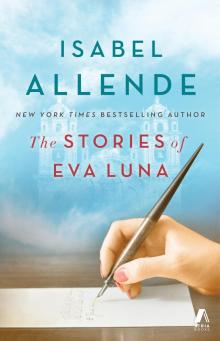 The Stories of Eva Luna
The Stories of Eva Luna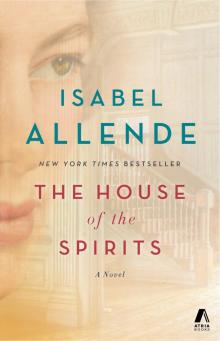 The House of the Spirits
The House of the Spirits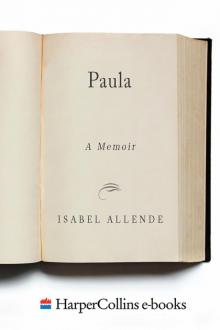 Paula
Paula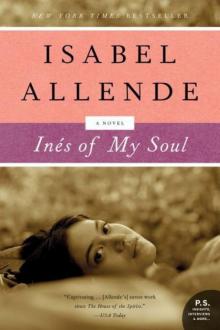 Ines of My Soul
Ines of My Soul Of Love and Shadows
Of Love and Shadows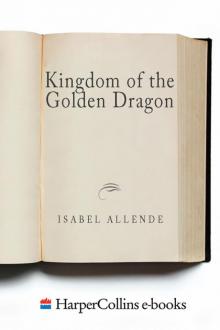 Kingdom of the Golden Dragon
Kingdom of the Golden Dragon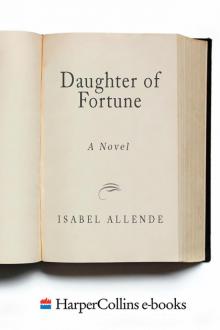 Daughter of Fortune
Daughter of Fortune City of the Beasts
City of the Beasts Maya's Notebook
Maya's Notebook Eva Luna
Eva Luna Zorro
Zorro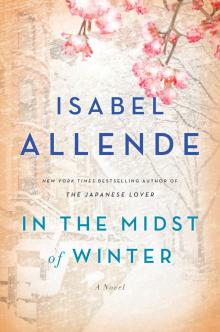 In the Midst of Winter
In the Midst of Winter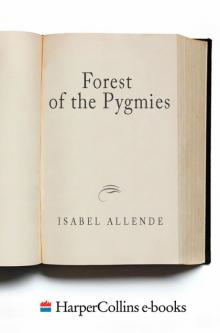 Forest of the Pygmies
Forest of the Pygmies My Invented Country: A Nostalgic Journey Through Chile
My Invented Country: A Nostalgic Journey Through Chile The Japanese Lover
The Japanese Lover Portrait in Sepia
Portrait in Sepia Island Beneath the Sea
Island Beneath the Sea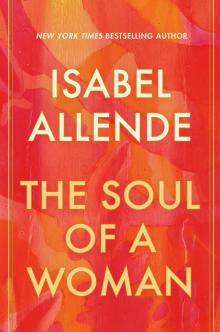 The Soul of a Woman
The Soul of a Woman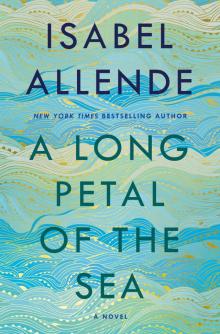 A Long Petal of the Sea
A Long Petal of the Sea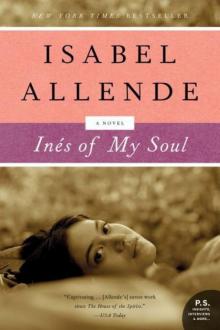 Ines of My Soul: A Novel
Ines of My Soul: A Novel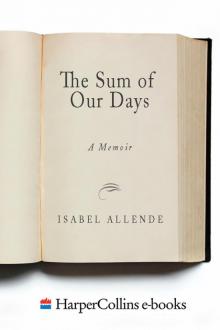 The Sum of Our Days
The Sum of Our Days